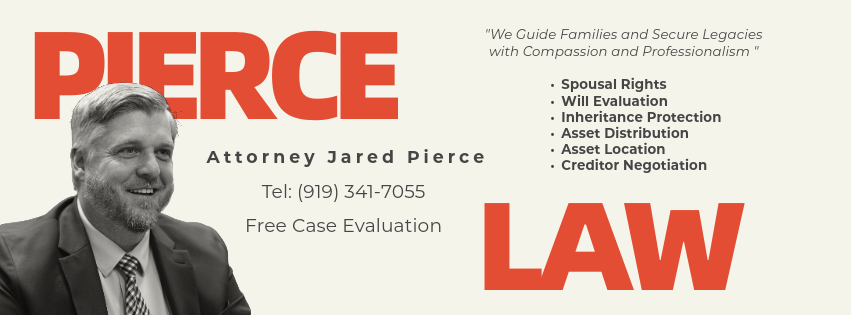North Carolina Probate Administration For Wrongful Death Cases
Table of Contents
- Introduction
- Understanding Probate in North Carolina
- The Role of the Personal Representative
- Wrongful Death: Key Considerations
- Relationship to Probate
- Estate Administration Requirements for Wrongful Death Actions
- Accounting and Distribution of Wrongful Death Proceeds
- Assets and Bond Requirements
- Common Pitfalls to Avoid
- Why You Need a “Probate Lawyer NC”
- How Pierce Law Group Can Help
- Take Action
Introduction
Probate administration can be a complicated process, especially in North Carolina, where unique state laws, court procedures, and guidelines can affect how estates are settled and distributed. Matters become even more complex when a wrongful death claim is involved. Whether you are an executor (Personal Representative), beneficiary, or interested party, navigating probate law requires a thorough understanding of your responsibilities and the legal landscape ahead. In this comprehensive guide, we will provide valuable insights into how wrongful death claims intersect with probate, when and how a Personal Representative can bring an action, and why working with a qualified probate lawyer NC is essential for protecting your rights and interests.
Throughout this article, we will weave in important considerations drawn from North Carolina statutes and practices. We will also emphasize key aspects surrounding wrongful death actions, their relationship to estate proceedings, the role of the probate attorney, how wrongful death proceeds are allocated, and the steps that need to be taken to meet all legal requirements. With the help of the right NC probate lawyer, you can ensure that the estate administration process is handled efficiently and effectively, even when faced with a potential wrongful death claim.
Understanding Probate in North Carolina
Probate is the formal court process through which a deceased person’s assets are identified, collected, and distributed to the rightful beneficiaries under a will or the Intestate Succession Act (if no valid will exists). In North Carolina, probate is overseen by the Clerk of Superior Court, who serves as the ex officio judge of probate. This role involves:
- Verifying the validity of a will (if one exists).
- Appointing a Personal Representative (Executor if testate; Administrator if intestate).
- Ensuring creditors are paid from the estate’s assets.
- Overseeing the final distribution of the decedent’s estate to beneficiaries.
When a wrongful death occurs, the administration of the estate intersects with litigation or settlement negotiations related to the death of the decedent. Understanding how these procedures work together is crucial, as the wrongful death lawyer and the Probate Attorney often collaborate to ensure compliance with state law.
The Role of the Personal Representative
A Personal Representative (PR), sometimes called the executor or administrator, plays a pivotal role in North Carolina probate administration. According to state law, the PR is responsible for opening the estate, managing estate assets, addressing creditor claims, and distributing the decedent’s property to the rightful beneficiaries. Among the most important duties of a PR is the responsibility to handle any actions related to a potential wrongful death claim. Specifically:
- The PR must maintain wrongful death actions: North Carolina statutes empower the PR to pursue or defend any legal action on behalf of the estate, including wrongful death lawsuits, to the full extent required for the benefit of beneficiaries.
- The PR can compromise or settle claims: Whether in litigation or not, the PR has the authority to reach settlements if it serves the best interests of the beneficiaries.
- The PR must report potential wrongful death actions: On the Application for Probate and Letters, the PR should disclose that there may be a wrongful death claim arising from the decedent’s passing.
- The PR must be mindful of distributions: If settlement proceeds are obtained, the PR must take reasonable steps to allocate funeral, burial, hospital, and medical expenses related to the wrongful death.
In essence, the PR is the point person for all estate-related legal matters, making it essential that the PR either has a solid understanding of probate or retains the services of an experienced NC probate lawyer to guide them in fulfilling these obligations properly.
Wrongful Death: Key Considerations
A wrongful death claim arises when an individual dies as a result of another party’s negligence, intentional harm, or misconduct. In North Carolina, the right to file a wrongful death lawsuit is vested in the Personal Representative or the collector of the estate. Some important highlights include:
- The PR or collector must file the wrongful death lawsuit: If someone other than the PR brings the lawsuit, it may be dismissed, making proper estate administration critical.
- Stand-alone wrongful death forms may be used: If the sole purpose of the estate administration is to pursue a wrongful death action, the Clerk can utilize specialized forms for that specific purpose.
- No beneficiaries, no wrongful death action: Under the Intestate Succession Act, if there are no beneficiaries, then there is no viable wrongful death claim to pursue because the real parties in interest would be the beneficiaries, not the estate itself.
Understanding these nuances is vital. The legal process for wrongful death can be lengthy and require specific procedural steps. Having a qualified wrongful death lawyer in addition to your Probate Attorney can alleviate the complexities by ensuring all legal documents and court mandates are properly filed and managed.



